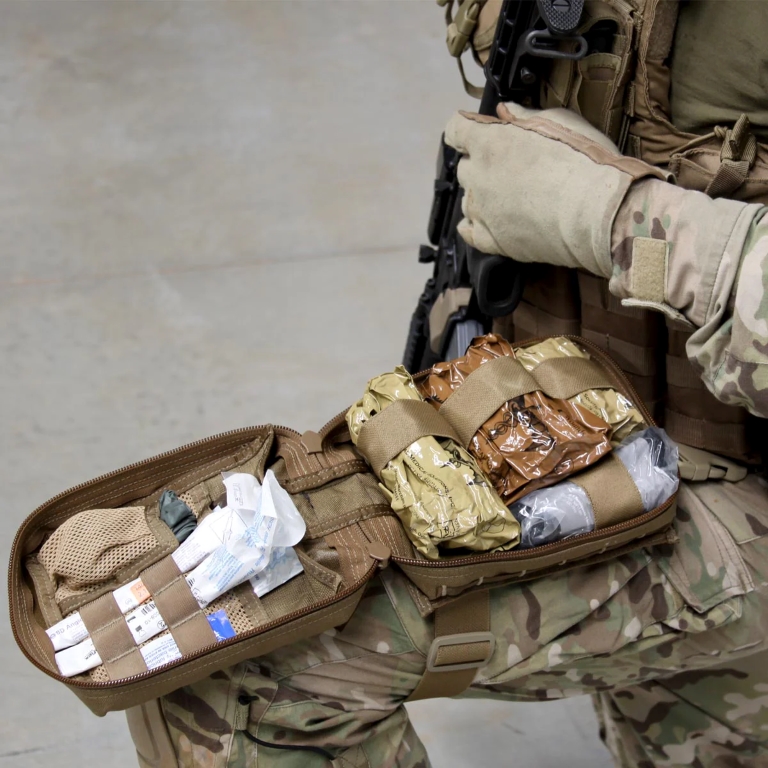Contents
The world of Special Forces operations is a crucible of challenge. Beyond the battlefield, Special Forces troops routinely operate in some of the most unforgiving environments imaginable: scorching deserts, bone-chilling arctic wastelands, dense and disease-ridden jungles, or treacherous mountain ranges. These austere environments present unique demands far beyond the typical soldier’s experience.
Life on the Line

In the unforgiving world of Special Forces operations, a misstep can mean a life-or-death situation. That’s where the essential medical pouches become a vital piece of equipment. Unlike a typical first-aid kit, the IFAK pouch is designed for immediate response to battlefield trauma. Think tourniquets to control bleeding, chest seals to treat collapsed lungs, and advanced dressings packed with hemostatic agents to stop blood flow rapidly. These specialised supplies can make the difference in the crucial minutes before advanced medical care is available.
But the IFAK medical pouches are only half the equation. Special Forces medics undergo rigorous training to become proficient in using these advanced medical supplies. The ability to perform life-saving interventions under pressure is paramount. The IFAK first aid, combined with this medical expertise, gives Special Forces teams the confidence to operate effectively, knowing they have the tools to fight for survival, even in the harshest environments.
Special Forces medics need the knowledge and skills to handle a wider range of medical emergencies beyond the medical pouch capabilities. This could include treating battlefield injuries, managing hypothermia, recognising and countering snakebites or other creatures, and administering basic dental care.
Finding Your Way in the Wild
While a map and compass are essential, Special Forces rely on a more sophisticated skillset. Advanced map & compass use, including dead reckoning and navigation, allows for precise location determination even without electronic aids. Additionally, knowledge of camouflage and concealment techniques helps maintain stealth and operational security.
Hydration
Water scarcity is a major threat in many austere environments. While basic water purification tablets or filters are important, Special Forces may need to employ more advanced techniques like rainwater collection or desert survival methods to extract water from unconventional sources.
Environmental Challenges
The battlefield for Special Forces isn’t confined to a single landscape. From the bone-chilling grip of the Arctic to the suffocating heat of the desert, Special Forces must adapt their survival tactics to a diverse range of environments, each presenting unique challenges.
Adapting to Diverse Terrain
Thin air, treacherous slopes, and unpredictable weather patterns demand specialised gear and mountaineering skills. Special Forces are adept at navigating icy terrain, using crampons and ice axes, and dealing with altitude sickness. Scorching temperatures, relentless sun, and limited water availability necessitate knowledge of desert survival techniques. Water extraction methods, proper hydration practices, and using shelters for shade become paramount.
Sub-zero temperatures, blinding blizzards, and limited daylight hours demand extreme cold weather expertise. Building effective snow shelters, using specialised clothing for insulation, and understanding the dangers of hypothermia are essential for survival.
Threat Assessment
While enemy combatants are a constant threat, Special Forces must also be aware of the inherent dangers posed by the environment itself. Understanding the behaviour and potential threats, from venomous snakes and insects to large predators, is crucial for avoiding encounters and mitigating risks. Flash floods, avalanches, earthquakes, and other natural disasters can arise with little warning. Special Forces need to be aware of potential hazards in each environment and have plans for mitigation or rapid response.
Mental Strength of Special Forces

The physical demands of Special Forces operations are undeniable. But equally important, and often less discussed, is the mental fortitude required for success. Operating in austere environments, facing constant danger, and making critical decisions under pressure all demand a robust mental framework.
The Unbreakable Bond
Leaders set the tone. Special Forces need strong leadership that fosters trust, inspires confidence, and maintains morale even in challenging situations. Effective communication, empathy, and the ability to delegate tasks are crucial. These forces operate as cohesive units. Teamwork, coordination, and the ability to rely on your teammates are essential for mission success. Mental resilience helps maintain focus and cooperation even during extreme stress or fatigue.
Overcoming Mental Fatigue and Making Tough Calls
Long deployments, sleep deprivation, and the constant strain of operating in hostile environments can lead to mental fatigue. Special Forces need mental discipline and coping mechanisms to maintain focus, prioritise tasks, and avoid lapses in judgment. Split-second decisions with life-or-death consequences are a reality for Special Forces.
Evasion and Escape
Even the best-laid plans can go awry. Special Forces need advanced evasion and escape training. This includes tracking, counter-surveillance to avoid capture, and the ability to navigate unfamiliar terrain while evading pursuit. The possibility of capture is a constant threat. Mental toughness helps Special Forces resist interrogation tactics, maintain hope, and plan for escape when the opportunity arises.
The Never-Ending Forge
The world of Special Forces operations is a crucible that demands physical prowess and an unwavering commitment to survival. In the face of diverse environments, potential threats, and the ever-present possibility of unforeseen circumstances, self-reliance and advanced survival skills become primary.

